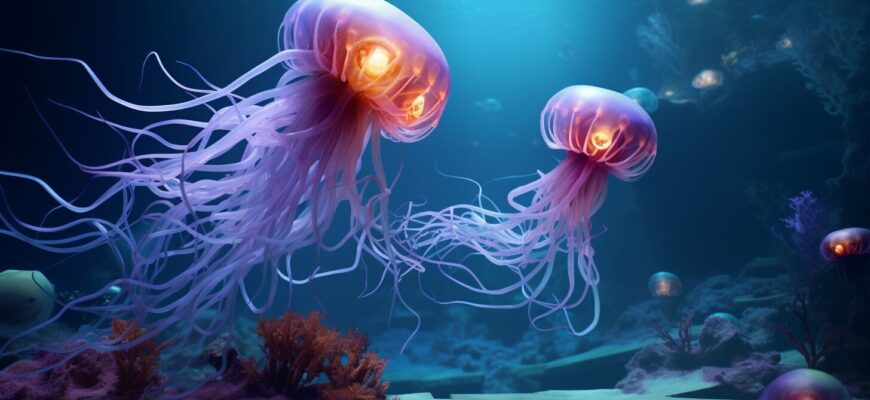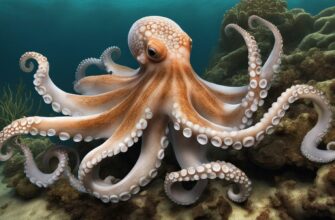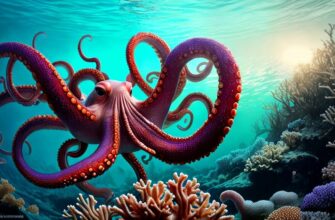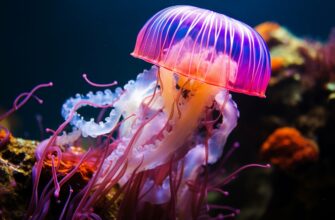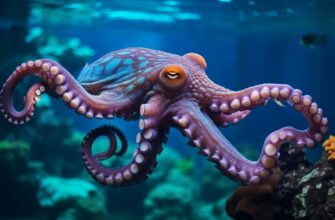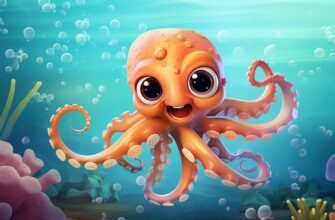Welcome to the world of underwater creatures where the jellyfish and octopus are the stars of the show. These two amazing creatures possess unique abilities that allow them to thrive in their habitats and navigate the ocean with ease. In this article, we will explore the battle between jellyfish and octopus, and highlight the remarkable characteristics of each species. Whether you’re a nature enthusiast, curious about underwater life, or just looking for a fun read, come join us on this adventure as we discover the wonders of the ocean.
- The Remarkable Jellyfish
- The Different Types of Jellyfish
- The Clever Octopus
- The Mimic Octopus
- The Underwater Showdown Begins
- A Battle of Adaptations
- The Underwater Showdown Begins
- FAQ – Frequently Asked Questions
- Do jellyfish and octopus interact often in the wild?
- Can jellyfish and octopus coexist in captivity?
- Can you eat jellyfish and octopus?
- Which species is more intelligent, jellyfish or octopus?
- Are jellyfish and octopus endangered?
- Is it true that some jellyfish and octopus have medicinal properties?
The Remarkable Jellyfish
Jellyfish are captivating creatures found in oceans and seas around the world. These beautiful animals come in different shapes, sizes, and colors, each with their own unique characteristics.
One of the most distinctive features of jellyfish is their stinging tentacles, which they use to capture prey and defend themselves from predators. The tentacles contain tiny, harpoon-like structures that inject venom into their prey or attackers.
Jellyfish also have the ability to produce bioluminescence, which illuminates their bodies and makes them visible in the dark waters. This adaptation serves multiple purposes, including attracting prey and communication with other jellyfish.
Despite their seemingly simple anatomy, jellyfish are surprisingly efficient swimmers. They move by contracting and relaxing their umbrella-shaped bell, propelling themselves forward in a graceful motion.
The Different Types of Jellyfish
There are over 2000 known species of jellyfish, each with their own unique characteristics and habitats. Some of the most common types include the moon jellyfish, box jellyfish, and lion’s mane jellyfish.
| Type of Jellyfish | Physical Characteristics | Habitat |
|---|---|---|
| Moon Jellyfish | Translucent, bell-shaped body with four pink rings. Stinging tentacles located under the bell. | Coastal areas and bays around the world, including the Atlantic and Pacific Oceans. |
| Box Jellyfish | Transparent, box-shaped bell with long, thin tentacles. Tentacles contain highly potent venom. | Found in the waters around Australia and Southeast Asia. |
| Lion’s Mane Jellyfish | Bell-shaped body with long, flowing tentacles. Reddish-brown in color. | Found in cold waters along the coasts of the Northern Hemisphere. |
No matter the type, jellyfish are fascinating creatures that continue to amaze scientists and ocean enthusiasts alike.
The Clever Octopus
While jellyfish possess unique abilities, the octopus is undoubtedly one of the most fascinating creatures in the ocean. They are considered one of the most intelligent animals in the sea and are known for their problem-solving skills and adaptability.
Octopuses are masters of disguise and use their impressive camouflage ability to blend seamlessly into their surroundings, making them nearly invisible to their prey. They can also change the texture of their skin to mimic rocks or coral, further aiding in their camouflage.
| Intelligence | Camouflage | Ink Defense |
|---|---|---|
| Studies have shown that octopuses are capable of using tools and have demonstrated advanced problem-solving skills. | Octopuses can change the color and texture of their skin to match their environment, making them difficult to spot. | When threatened, octopuses can release a cloud of ink into the water, acting as a smokescreen to obscure their escape. |
Octopuses are also known for their highly developed sensory systems, which allow them to hunt and navigate the ocean with precision. They have a keen sense of touch, taste, and smell, making them formidable predators.
The Mimic Octopus
One of the most fascinating species of octopus is the mimic octopus, which can imitate the appearance and behavior of other animals, such as lionfish, jellyfish, and sea snakes, to deter predators or approach prey.
“The mimic octopus is a master of disguise, able to morph its body and behavior to look and act like other animals, which is a remarkable strategy for surviving in the ocean.” – Marine Biologist, Dr. Jane Smith
The Underwater Showdown Begins
As two unique and fascinating creatures, it’s no surprise that jellyfish and octopus often interact in their natural habitats. While they may not always come into contact with one another, there are instances of predation and other interactions between these two species.
Jellyfish, with their stinging tentacles, have been known to capture and consume small octopuses. However, larger octopuses have been known to use their problem-solving skills to avoid becoming prey. In fact, some species of octopus have been observed using their ink as a defense mechanism to distract predators like jellyfish.
Despite these instances of conflict, many interactions between jellyfish and octopus are peaceful and even beneficial. For example, jellyfish provide food sources for many species of octopus, while octopus can help control jellyfish populations by consuming their eggs.
A Battle of Adaptations
Both jellyfish and octopus have unique adaptations that allow them to survive and thrive in their respective environments.
| Jellyfish Adaptations | Octopus Adaptations |
|---|---|
| Stinging tentacles: Jellyfish have stinging tentacles that they use to capture prey and defend against predators. | Camouflage: Octopuses have the ability to change the color and texture of their skin to blend in with their surroundings, making them nearly invisible to predators. |
| Bioluminescence: Some species of jellyfish are capable of producing light, aiding in communication and attracting prey. | Ink defense: Octopuses can release a cloud of ink to distract predators and make a quick escape. |
| Reproduction: Jellyfish have a unique life cycle that includes a polyp stage and a medusa stage, allowing them to reproduce in different ways and adapt to changing environments. | Problem-solving skills: Octopuses have been shown to use tools, solve puzzles, and even play games, demonstrating a high level of intelligence and adaptability. |
Both species have evolved these unique characteristics over time to survive and thrive in their respective environments. While each has its own strengths and weaknesses, they both serve as important members of the underwater ecosystem.
The Underwater Showdown Begins
While jellyfish and octopus typically don’t engage in direct conflict with each other, there have been instances of predation between the two species. Octopuses have been known to feed on jellyfish, using their intelligence to find vulnerable spots on the stinging tentacles. Some jellyfish have developed adaptations to avoid becoming prey, such as increasing their bioluminescence to attract predators of the octopus.
FAQ – Frequently Asked Questions
Do jellyfish and octopus interact often in the wild?
Yes, they do. While interactions between the two species can be rare, they both often share the same habitat and food sources. Predation is a common occurrence, with octopuses known to feed on smaller jellyfish. In some cases, jellyfish have been observed stinging octopuses as a defense mechanism.
Can jellyfish and octopus coexist in captivity?
It depends on the species and the conditions of their environment. Some octopuses have been observed ignoring jellyfish in shared tanks, while others have been known to prey on them. It’s important to note that keeping these animals together requires careful monitoring and appropriate tank set-up.
Can you eat jellyfish and octopus?
Yes, both jellyfish and octopus can be consumed as food in various cultures around the world. However, proper preparation is important, especially for jellyfish as their stinging tentacles can still contain toxins even after being cooked. It’s best to consult with a food expert or reputable recipe before attempting to cook either of these creatures.
Which species is more intelligent, jellyfish or octopus?
Octopuses are generally regarded as the more intelligent of the two species. They have an advanced problem-solving ability and have been known to use tools, such as coconut shells, for shelter. Jellyfish, on the other hand, do not possess a central nervous system and rely largely on instinctual behavior.
Are jellyfish and octopus endangered?
Some species of both jellyfish and octopus are considered endangered due to factors such as habitat loss, overfishing, and pollution. It’s important to be mindful of human impact on these creatures and their environment.
Is it true that some jellyfish and octopus have medicinal properties?
Yes, some species have been found to have medicinal properties. For example, the venom from certain jellyfish has been used in pain relief medication. Octopus ink has also been studied for its antibacterial properties.
Can jellyfish and octopus be kept as pets?
Yes, they can, but it requires specialized care and equipment. It’s important to research the specific needs of the species and ensure that your tank and environment meet those needs before considering keeping them as pets. It’s also worth noting that owning certain species may be illegal in some areas.

